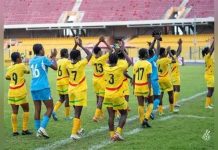
Africa-Press – Ghana. The Jatikay Centre for Human Security and Peace Building is calling on the Government of Ghana to take steps to address issues of marginalisation of Fulanis in the country.
In a press release signed by Executive Director Adib Saani, it stresses that marginalising the minority group in the country is a threat to national security that needs to be critically looked at and solved.
“Not all Fulanis are foreigners. We appeal to the government to do more to curb impunity and safeguard the rights of minorities in Ghana.
“Government should foster deeper collaboration with the Fulani community in Ghana so that together, we can be partners for peaceful co-existence and development,” parts of the press release from the Jatikay Centre for Human Security and Peace Building has said.
The concern raised comes on the back of the recent brutalities suffered by Fulanis in the country.
Just a week ago, a mob, numbering about 100, attacked and killed 9 Fulanis at Zakoli, a suburb of Yendi in the Northern Region of Ghana.
Some of the victims were shot at close range and others were burnt alive.
Below is the press release from Jatikay Centre for Human Security and Peace Building:
SEEMING MARGINALISATION OF FULANIS IN GHANA; A SERIOUS THREAT TO NATIONAL SECURITY
Jatikay Centre for Human Security and Peace Building has noted with grave concern the unending cycle of violence against Fulani communities in Ghana and the seeming police inaction in arresting perpetrators.
About a week ago, a mob, numbering about 100, attacked and killed 9 Fulanis at Zakoli, a suburb of Yendi.
Some of the victims were shot at close range and others burnt alive.
We are shocked by the inability of the Ghana Police Service to arrest a single suspect days after the incident.
Not even a statement has been issued by the police in respect of the crime. Jatikay Centre has had the opportunity to interview some leaders of the Fulani Community in Ghana and they appear to be having a hectic job appealing to their fellows to remain calm.
According to them, their peace advocacy in the face of the attacks is proving ineffective because of the inaction of the police in arresting the culprits. This obviously poses a major threat to the security of the state in a sense that the proliferation of small arms and light weapons has resulted in many of the residents of the communities in that area being armed to the teeth.
When Fulanis stage revenge attacks, it could start a full-blown conflict. Already, there are many human insecurities that have pushed a lot of young people in the area into uncertainty.
Any trigger can cause these young people to explode into open belligerence as they already do not have much to live for. Fulanis are regularly “victims” of ethnically-based stereotypes, prejudices, violence and discrimination within Ghanaian society.
In Gushegu in 2014, 14 Fulanis were killed and their houses burned. In Gulumpe and Babato, 25 Fulanis were also killed.
In 2019, in Bagurugu in the Northern Region, 68 homes belonging to Fulanis were destroyed. In 2021 alone, Fulanis in Chamba in the Nanumba North District were attacked and their cows, numbering about 500, were killed, among several other incidents.
To date, families of victims are still anticipating justice, with some having completely lost hope of that ever happening. There are also reports of some Fulanis being denied services such as Ghana Card registration, healthcare delivery, and passport acquisition. Fulanis in areas such as Sampa and Zabzugu have allegedly had their Ghanaian passports seized by immigration officials under the pretext that they can’t be Ghanaian.
Marginalisation is a major cause of insurgency, as characterised in Burkina Faso and Mali.
When a minority group feels let down by the state and their fundamental rights are thrown to the dogs, they fight back eventually.
The struggle of the Azawads in Mali stems from long-lasting grievances of marginalization. Jatikay Centre believes that Ghanaian authorities need to do more to protect minorities in the country so they don’t become vulnerable to terrorists.
The media also needs to be circumspect in their reporting as that influences negative stereotypes.
It is certainly unfair to paint all Fulanis with a single stroke of brush because of the actions of a negligible few.
A lot of Ghanaians need education on the history of Fulanis in Ghana. Everybody comes from somewhere. The first census, held in 1891, in Ghana reported Fulani communities.
Most Fulanis seen today are 3rd or 4th generation Fulanis whose forefathers lived in Ghana way before independence, like the 2nd lady of the Republic, Hajia Samira Bawumia.
Not all Fulanis are foreigners. We appeal to the government to do more to curb impunity and safeguard the rights of minorities in Ghana.
Government should foster deeper collaboration with the Fulani community in Ghana so that together, we can be partners for peaceful co-existence and development.
For More News And Analysis About Ghana Follow Africa-Press






